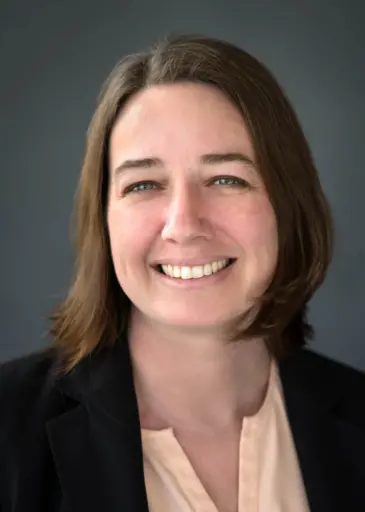 Jennifer Reed
Jennifer Reed
On July 5, 2020, Karen and William Monfre Professor of Chemical and Biological Engineering Jennifer Reed passed away at age 41 after a protracted struggle with cancer. Reed’s passing is a tragic loss for the university and devastating for the colleagues, students, friends and family members who loved and respected her.
After earning her PhD at the University of California-San Diego, Reed joined the chemical and biological engineering faculty in 2007. Her work focused on modeling microbial metabolism and regulation, quickly earning Reed many honors, including a National Science Foundation CAREER award, an early career award from the U.S. Department of Energy and the prestigious NSF Presidential Early Career Award for Science and Engineering (PECASE).
She was a major contributor to the Great Lakes Bioenergy Research Center (GLBRC), a cross-disciplinary center working on the development of sustainable biofuels. Director Tim Donohue says Reed joined UW-Madison just as the GLBRC was getting underway. “We had a big hole that we needed to fill around modeling microbial pathways,” he says. “Lucky for us, Jennie decided to accept the offer to come here.”
The open and collaborative way Reed conducted science, says Donohue, helped lead to GLBRC’s long-term success. “It’s a huge collaborative and intellectual loss we’ve experienced with her passing,” he says.
To honor her legacy, GLBRC recently established the Jennifer L. Reed Bioenergy Science Award, which recognizes contributions to the center by early career women.
Milton J. and A. Maude Shoemaker Professor of Chemical and Biological Engineering Sean Palecek’s office was right next door to Reed, and he got to know her well over the years. One of the secrets of her success in the lab, he says, was her attitude. Not only was she ambitious and exceptionally hardworking, but she also was unflappable.
“Jennie was just one of the more upbeat people in the department,” says Palecek. “After a faculty meeting, or if something was going on, I’d start complaining to her. She would just put a positive spin on it and that was able to turn me around. She was great to have around.”
Jay and Cynthia Ihlenfeld Professor of Chemical and Biological Engineering Brian Pfleger spent lots of time with Reed. Pfleger, an experimentalist, and Reed, whose work was primarily computational, were hired just two weeks apart, with many overlapping research interests. After both of them received tenure, they decided to integrate their labs, leading to years of collaborative research.
“She was hardworking, creative, brilliant, kind and patient. But most importantly, she was just fiercely strong,” he says. “If she wanted to do something, no matter what the obstacle, she was going to get through it and accomplish that goal.”
Reed wasn’t all about work. She was something of an oenophile—the person other faculty members turned to for recommendations for a great glass of wine or the best restaurant for out-of-town visitors. She had a passion for cars and liked nothing more than taking her vintage Porsche out for a spin.
Her biggest impact, however, may be on the students she taught and mentored during her career, which earned her several teaching awards. “Jennie was a gifted teacher who simultaneously challenged and supported her students in the classroom, and an extraordinarily caring mentor to the graduate and undergraduate students in her research group,” says R. Byron Bird Department Chair Regina Murphy. “Even in the face of her declining health, Jennie’s greatest concern was for the continued progress and success of her students.”
Reed’s style was to challenge and guide her students while also giving them space to pursue their passions. She was as concerned with their personal lives as their research, helping them make plans for the future and ensuring they also had fun. She’d take her graduate students out for bowling nights, waterskiing trips and host backyard barbecues.
In fact, one of the first things Reed did in February 2020 after learning her prognosis was to contact her former graduate students from across the country, letting them know the news. Almost all of them gathered via Skype to catch up in a meeting full of laughter, good memories and a cameo by a new baby.
Shu Pan, who earned her PhD under Reed in 2018 was on that final Skype meeting. Reed never let her medical setbacks interrupt her research or mentoring, something her students admired. “It’s just very impressive how she was still taking care of her work,” Pan says. “There must have been some real passion there.”
While Reed’s research contributions to biological engineering are substantial, Pfleger says her brightest gift was mentoring students. “If I were going to make a list of what her proudest accomplishments should be, the fantastic people that she’s trained and made better are at the top,” he says. “They are going to be her lasting legacy.”
If you are interested in contributing to the Jennifer L. Reed Memorial Undergraduate Research Award, please go to https://www.supportuw.org/giveto/reedresearchaward.